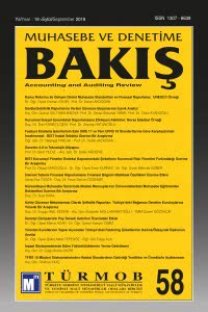İÇ KONTROL SİSTEMİNİN ETKİNLİĞİ ARTTIRMADA BİLGİ İFŞASI MODELİNİN KURULMASI
İç Kontrol, Bilgi İfşası, Etik
ESTABLISHMENT OF WHISTLEBLOWING MODEL IN INCREASING THE EFFECTIVE- NESS OF THE INTERNAL CONTROL SYSTEM
Internal Control, Whistleblowing, Ethic,
___
- Association of Certified Fraud Examiners. 2012. Report To The Natıons On Occupatıonal Fraud And Abuse. https://www.acfe.com/uploadedFiles/ACFE_Website/Content/rttn/2012-report-to-nations.pdf (Erişim Tarihi: 10.01.2018)
- Association of Certified Fraud Examiners. 2016. Report To The Natıons On Occupatıonal Fraud And Abuse. http://www.acfe.com/rttn2016/docs/2016-report-to-the-nations.pdf (Erişim Tarihi: 10.01.2018)
- Budak, G. Budak, G. (2004), İşletme Yönetimi, Barış Yayınları, İzmir.
- Güredin, E. (2014), Denetim ve Güvence Hizmetleri, Türkmen Kitabevi, İstanbul.
- Hersh, M.A. (2002). Whistleblowers-Heroes or Traıtors?: Individual And Collective Responsıbılıty For Ethıcal Behavıour, Annual Reviews in Control, 26, 243-262.
- Kamu Gözetim Kurumu, Finansal Raporlamaya İlişkin Kavramsal Çerçeve, http://kgk.gov.tr/Portalv2Uploads/files/DynamicContentFiles/T%C3%BCrkiye%20Muhasebe%20Standartlar%C4%B1/TMSTFRS2018Seti/Finansal%20Raporlamaya%20%C4%B0li%C5%9Fkin%20Kavramsal%20 %C3%87er%C3%A7eve/K%C3%87_2018.pdf (Erişim Tarihi: 19.01.2018)
- Kehinde, F. H. ve Osagie O. U. I. (2017), Effective Whistle-blowing Mechanism and Audit Committee in Nigerian Banking Sector, Journal of Business and Management Sciences, Vol. 5, No. 1, 18-26 http://pubs.sciepub.com/ jbms/5/1/3/index.html (Erişim Tarihi: 15.01.2017)
- Mercan, N. Altınay, A. ve Aksanyar, Y. (2012), Whistleblowing (Bilgi İfşası, İhbar) ve Yolsuzlukla Mücadelede İç Denetimin Değişen ve Gelişen Rolü, Organizasyon ve Yönetim Bilimleri Dergisi, 4(2).
- Mucuk, İ. (2008), Modern İşletmecilik, Türkmen Kitabevi, İstanbul.
- Near, J.P. ve Miceli, M.P. (1985), Organizational Dissidence: The Case of Whistle-Blowing, Journal of Business Ethics, https://link.springer.com/content/pdf/10.1007%2FBF00382668.pdf (Erişim Tarihi: 05.10.2017)
- Park, H. Blenkinsopp, J. Oktem, M.K. ve Ömürgönülşen, U. (2008), Cultural Orientation and Attitudes Toward Different Forms of Whistleblowing: A Comparison of South Korea, Turkey, and the U.K. Journal of Business Ethics, 82.
- Pickett, K. H. S. (2003), The Internal Auditing Handbook, Publication Data, UK. The Institute of Internal Auditors – IIA, https://na.theiia.org/translations/PublicDocuments/IPPF-Standards-2017-Turkish.pdf (Erişim Tarihi: 25.01.2017)
- Uyar, Süleyman ve Yelgen, Esin (2015), “Bilgi İfşası (Whistleblowing) Ve Denetim”, Yönetim ve Ekonomi Araştırmaları Dergisi, Cilt:13 Sayı:1, Ocak, 85-106.
- 5018 sayılı Kamu Mali Yönetimi ve Kontrol Kanunu, http://www.mevzuat.gov.tr/MevzuatMetin/1.5.5018.pdf (Erişim Tarihi: 17.10.2017)
- 6102 sayılı Türk Ticaret Kanunu, http://www.mevzuat.gov.tr/MevzuatMetin/1.5.6102.pdf (Erişim Tarihi: 23.09.2017)
- ISSN: 1307-6639
- Yayın Aralığı: 3
- Başlangıç: 2000
- Yayıncı: TÜRMOB
İÇ DENETİMDE KURUMSAL KÜLTÜR DENETİMİ
HİLE ALANINDA BİLİMSEL DERGİLERDE YER ALAN ULUSAL MAKALELER: 2008-2017 LİTERATÜR TARAMASI
Çiğdem KURUÇAY, Murat SERÇEMELİ
HİLE ALANINDA BİLİMSEL DERGİLERDE YER ALAN ULUSAL MAKALELER: (2008-2017 LİTERATÜR TARAMASI)
Çİğdem KURUÇAY, MURAT SERÇEMELİ
İÇ KONTROL SİSTEMİNİN ETKİNLİĞİ ARTTIRMADA BİLGİ İFŞASI MODELİNİN KURULMASI
GÜLÜMSER ÜNKAYA, GÜNAY DENİZ DURSUN
BULANIK MANTIK YÖNTEMİYLE AÇLIK KAN ŞEKERİ KARLILIK ANALİZİ: BİR SAĞLIK KURULUŞUNDA UYGULAMA
ÖNCÜLLERİ VE SONUÇLARI BAĞLAMINDA “WHISTLEBLOWING: SORUN BİLDİRME”
